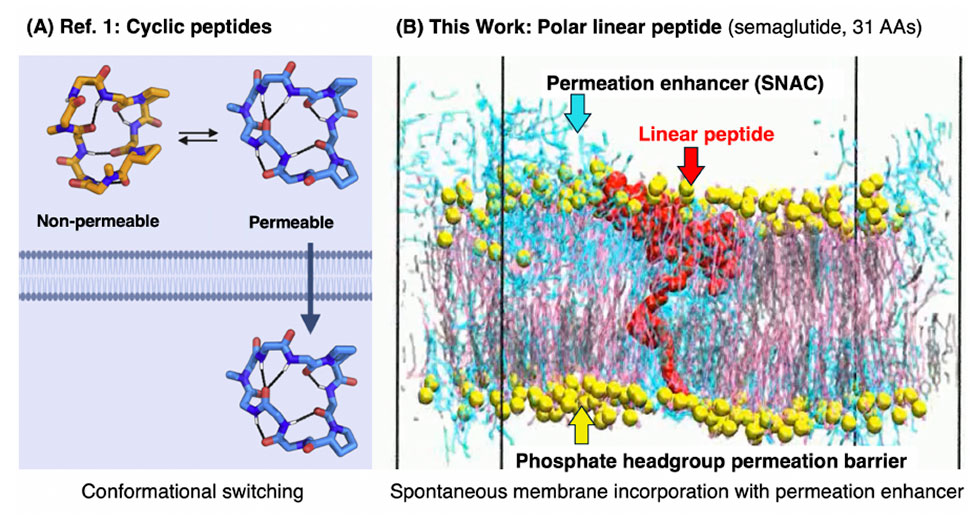Severin Schneebeli
Associate Professor
Purdue University
Talk Information
Strategies for Membrane Permeability or Oral Bioavailability
16 June 2025, 08:55am - 09:10am, in the Pacific Jewel Ballroom
L03 – The Molecular Basis of Oral Peptide Delivery with Permeation Enhancers

Professor Severin T. Schneebeli serves as an Associate Professor in the Departments of Industrial & Molecular Pharmaceutics and Chemistry at Purdue University. His research focuses on advancing protein biotechnology through the development of precision macromolecular scaffolds, aiming to enhance the formulation and delivery of peptide and protein drugs.
Academic Background
Dr. Schneebeli earned his B.A. in Chemistry from the University of Zurich in 2006 and completed his Ph.D. in Chemistry at Columbia University in 2011. He then pursued postdoctoral research as an International Institute for Nanotechnology Fellow at Northwestern University, working with Nobel Laureate Sir Fraser Stoddart on the synthesis and modeling of advanced molecular machines. Prior to joining Purdue University in 2022, he was a faculty member at the University of Vermont, where he also served as Director of the Materials Science Program.
Research Focus
Professor Schneebeli's laboratory operates at the intersection of supramolecular chemistry, organic synthesis, and computational modeling. His team designs and synthesizes artificial antibodies and enzymes to improve the stability and delivery of biopharmaceuticals. Utilizing multiscale computer modeling, they develop functional systems that are subsequently synthesized and tested in the lab, contributing to advancements in peptide drug stabilization and delivery.
Notable Contributions
Dr. Schneebeli has been recognized with several prestigious awards, including the NIH MIRA Award, 2022, Thieme Chemistry Journals Award, 2020, NSF CAREER Award, 2019, and the Army Research Office Young Investigator Award, 2018. His research has led to the development of novel macromolecular structures that function as artificial enzymes and antibodies, offering new approaches to biopharmaceutical manufacturing and delivery.
Professional Engagements
Beyond his research, Professor Schneebeli is actively involved in mentoring students across various levels, providing interdisciplinary training in areas such as industrial and physical pharmacy, organic synthesis, and computational chemistry. He also contributes to the scientific community through service as a grant reviewer and panelist for federal funding agencies, including the NIH, NSF, ARO, and DOE.
Through his innovative research and dedication to education, Professor Severin T. Schneebeli continues to make significant contributions to the fields of chemical biology and pharmaceutical sciences.
The Molecular Basis of Oral Peptide Delivery with Permeation Enhancers
Department of Industrial and Molecular Pharmaceutics and Tarpo Department of Chemistry, Purdue University, West Lafayette, Indiana, USA
GLP-1 agonists, such as semaglutide, the active ingredient in Ozempic, are commonly used peptide drugs for treating type 2 diabetes and obesity, with their pharmacokinetic properties—particularly absorption—being crucial in peptide drug research and development. It is projected that more than 9% of Americans will be taking GLP-1 agonists by 2030, and oral formulations of these peptide drugs play a vital role in enhancing patient compliance, convenience, and reducing healthcare costs.

However, while the membrane permeation mechanisms of many cyclic peptides are relatively well understood1, there remains limited knowledge about how a large, polar peptide like semaglutide in an oral formulation, for instance, with a permeation enhancer, can cross the intestinal barrier. This fundamental gap in understanding has hindered the rational design of improved oral peptide drugs and formulations.
To shed light on this essential mechanism and ultimately improve oral peptide drugs, this presentation will discuss recent advances from the Schneebeli lab, focusing on high-throughput peptide selection and mechanistic insights into how linear, polar peptide drugs like semaglutide can permeate membranes, aided by permeation enhancers, which are key components of oral peptide formulations like Rybelsus—the oral version of Ozempic. Our new permeation mechanism for peptides is supported by computational and experimental results, in particular accurate constant pH molecular dynamics simulations, which demonstrate for the first time how semaglutide can spontaneously embed itself into a membrane, thereby validating a long-hypothesized oral absorption mechanism.
1. Baker, D. et al. Cell 2022, 185, 3520–3532.
2. Colston, K. J.; Faivre, K. T.; Schneebeli, S. T. ChemRxiv 2025; DOI: 10.26434/chemrxiv-2025-n24f8.

